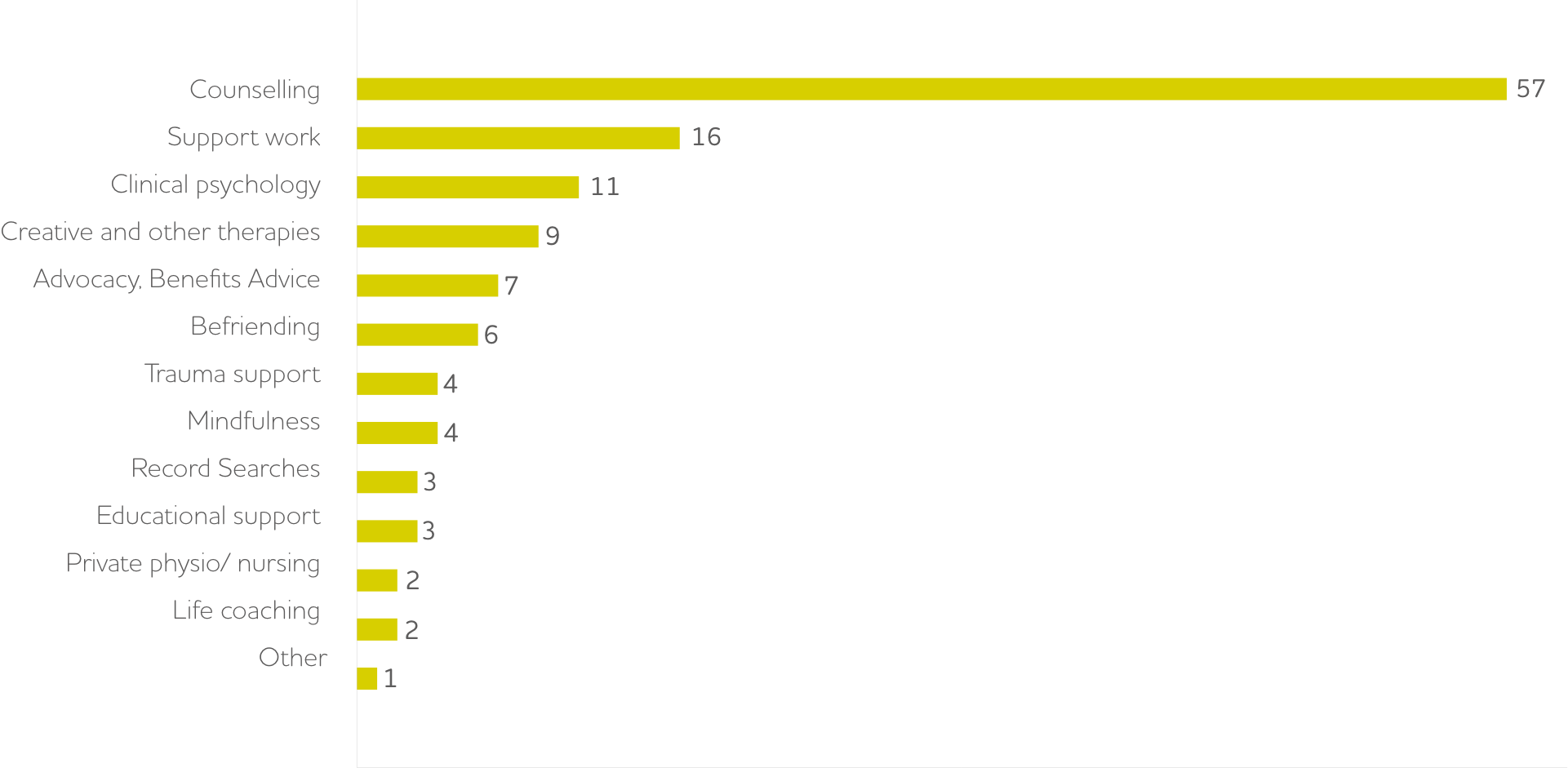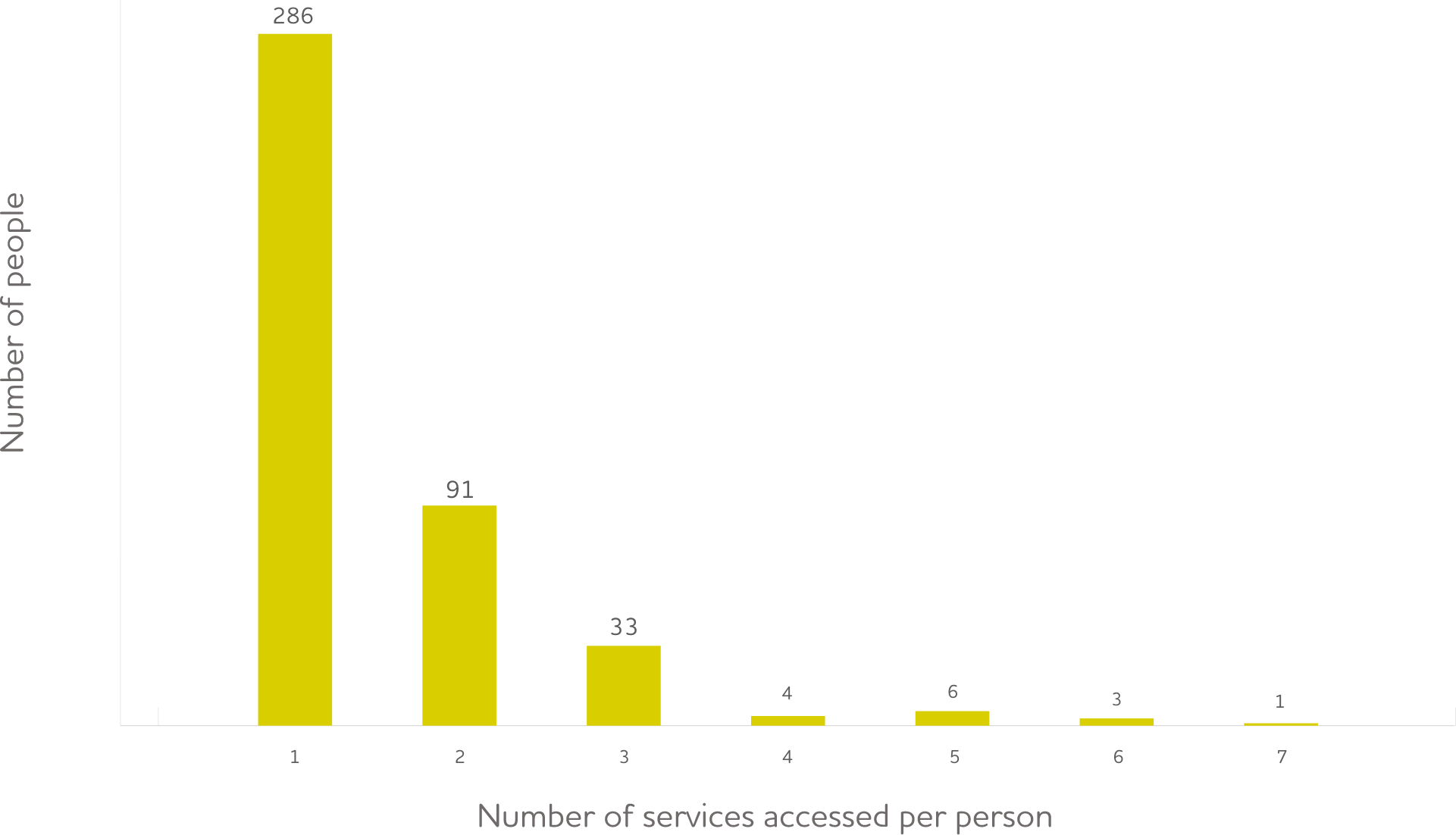Enabling access to services
1
Future Pathways has helped people to access a wide range of high-quality services
The people who register with Future Pathways have a wide range of needs, and so we have worked with more than 70 different professionals and organisations to ensure that individuals get support that fits their unique circumstances.
At any one time, we are typically supporting between 200 and 250 people to access services provided by our partners. These can take many different forms.
Services Available from Delivery Partners (December 2019)

A single organisation may provide more than one type of service.
2
Accessing a range of services is important because survivors’ needs vary.
About a third of the people who have used our partners’ services have used more than one service. Having a wide range of services available is useful to people.
Number of services accessed per person (from project start until December 2019)

Accessing a range of services is important because survivors’ needs vary.
314
people have accessed records of their time in care. Two of our partners – Birthlink and Wellbeing Scotland – now help with people who need this type of support.

339
people have had counselling. The length of time varies, but the average is six months.
418
people have been referred to the Glasgow Psychological Trauma Service for psychological assessment.
3
Future Pathways is valued, both by our partners and by the people we support
About a third of the people who have used our partners’ services have used more than one service. Having a wide range of services available is useful to people.
What our partners say
We regularly review our work with partners, and ask them what it is like to work with us. They tell us that we collaborate well, and that they like dealing with us.
Here’s what they say…
“We’ve got a very flexible and responsive relationship and its professional, andthey understand the need for trauma-informed and person-centred support.”

“I think it’s been a beneficial mutual partnership”


Partners have shared examples of how they have changed practice to suit the needs of survivors better. A dentist was able to offer treatment in a way that avoided psychological triggers, and a massage therapist used the principles of trauma-informed practice when giving someone their first massage.
Our partners sometimes experience challenges when working with people. Like, ensuring that their staff have the experience they need; contacting people; and people not turning up for appointments. We are also aware of several social care assessments and house moves that proceeded only because of Support Coordinators’ help to navigate systems, and to explain what someone needed and why this was important.
What survivors say
“In the past service providers have been overtly judgemental. This is not my experience of Future Pathways”

Services need to work together better.

“Happy with the help I get.”

Some people told us that would like to have more choice or control. This is important, because the biggest single reason for people to stop getting support is that they felt that the service provider was not right for them.
These observations show how helpful it is if people can test support options. They also explain why it can take time to find the right service.

4
Our partners are keen to share their learning, and to work together to improve
Our partners say that people referred from Future Pathways tend to be living with multiple difficulties and have greater past experience of trauma compared to those referred to them in other ways.
Many partners said that they valued the training that they had received on trauma-informed approaches, and that they wanted more of this. Partners also want to share their knowledge, insight and expertise. Many said that they would like to have some type of information-sharing day with Future Pathways and our Support Coordinators. They said that this would help them to build their networks, and to fill any gaps in their knowledge about Future
Pathways’ processes. Several partners said they would like more opportunities to promote their service to the rest of the Future Pathways team.

5
People appreciate our efforts to improve our own procedures
Before we start working with a new partner, we ask them to show that they meet certain quality standards. Bigger organisations are familiar with contracting processes, and don’t mind providing us with the information we need. By contrast, very small services can struggle with this.
We have streamlined our administrative support processes and paperwork to make it as easy as possible for our partners.
Looking ahead
As Redress legislation progresses this may increase people’s requirements for support. Not just in practical terms, such as help with the application process, or obtaining records of their time in care but also emotionally. Many people have fought for redress, acknowledgement and apology for some time, and may require support to deal with this experience.
We have learned a lot about how to connect people with the services the need, and there is still much more to learn. In the future, we will do more to highlight how people experience support, and work with delivery partners to reduce barriers. We will also share our experience so that others can benefit from it.
